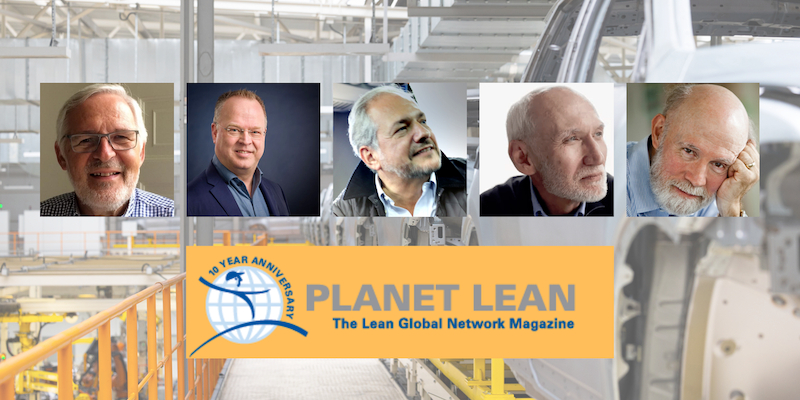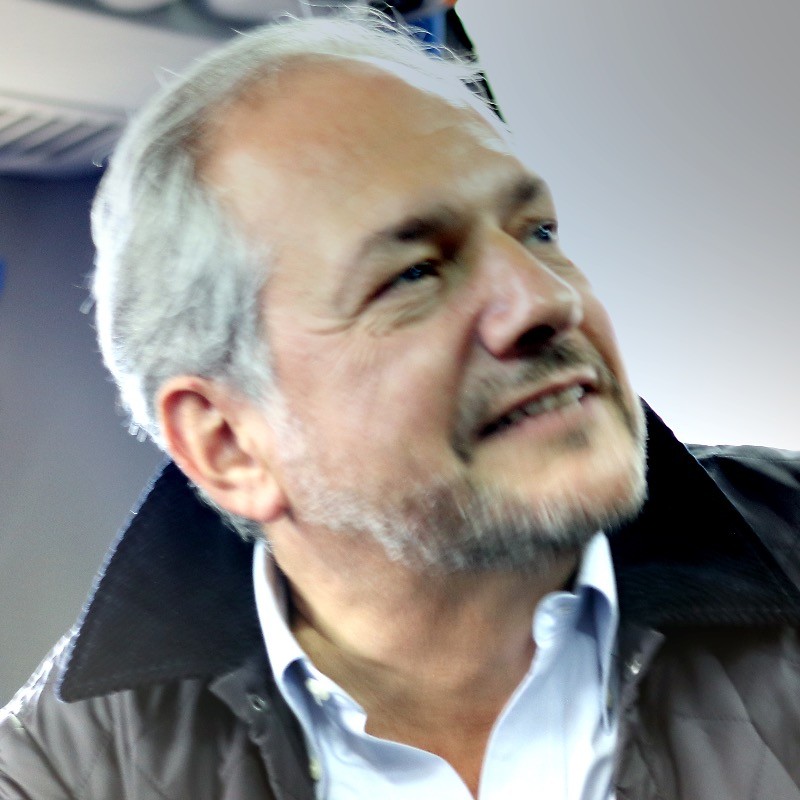Sparring about your Lean issue?
Call René

Dan Jones When I worked with Tesco to apply the lessons of Toyota's just-in-time Parts Distribution System to their supply chains, they said, "We can't do this alone - we have to bring the rest of the food industry with us." So we distilled stories from our early projects with willing suppliers and told them at many conferences across Europe. With the help of Alan Mitchell, who covered the food industry for the Financial Times, we also created a successful communications channel to spread the word.
This convinced me that we needed such a communication channel for the growing Lean movement. When I found Roberto Priolo, I knew we had the right person to lead it. He was very quick to understand the importance of a story and could turn it into readable prose much faster than all of us. He was also willing to travel the world to find new angles. Michael Ballé and I convinced René Aernoudts to support us, and Planet Lean was born. Over time, it became the glue that holds the Lean Global Network together. One of the best hunches I ever had, and I am very proud of what Roberto has done with it. May it continue to inspire others to follow their path to Lean .

René Aernoudts It's great that Planet Lean is already 10 years old! Time really flies...
I remember how Dan launched the idea and got me excited about it. It took some heated discussions with the executive committee of the Lean Global Network, and several iterations of the A3 I created before we could actually launch the website.
Roberto has been key to the success of all this over the years, doing countless interviews and iterations of articles, and learning how to create and tune videos for all our LGN colleagues.
Thank you to everyone who was willing to share their stories, ideas and inspiration, and to the entire Lean Global Network for supporting Planet Lean.
On to the next10 years!

Michael Ballé The Lean movement is unique in management thinking. This is not only because it is an alternative to finance-dominated MBA thinking and offers a way for business leaders to align business performance and personal and professional fulfillment of employees, but also because it is a truly international movement. It is a system built from ideas from many different countries: Japan, the U.S., clearly, but also Germany, the Scandinavian countries with their unusual social model, and Brazil or China, where many original Lean-experiments were carried out by Taiichi Ohno.
Personally, I recently recounted the birth of The Lean Strategy: it began with a discussion with Marcus Chao and Joe Lee in Taiwan, after meeting on the shop floor with Toyota sensei and Ohno alumnus Takehiko Harada. We continued these ideas with Dan Jones, on the way back from a Lean conference in Germany - which led to further discussions with Jacques Chaize from France and Orry Fiume from the US. I find this cultural melting pot to bring a waste-free world management ideal to life fascinating.
Thanks to Roberto's tireless work to find and publish Lean-stories from around the world, we can see the true scale and scope of the Lean-ideal and all its many experiments and initiatives. Planet Lean makes the Lean-movement in a way that projects never will, because they pass by and - as we know - so rarely contribute to real transformation because senior leaders often fail to see the big Lean-picture and what it means for the sustainable, profitable success of their companies.
Ten years is a long time, and such a short time to change ideas. Congratulations to Planet Lean and to all its contributors! Well done, Roberto, and on to the next ten years!

JohnShook Ten years. It has flown by. For each of us personally. To me, it really seems like it was yesterday that a group of us considered the rough idea of creating an alternative "magazine" to capture the myriad stories of Lean-progress that we saw happening around the world. From there a small trial to see what the magazine might look like and whether we could actually make it happen, to assigning a name (Planet Lean? Lean Planet?) to a decade of over 1,100+ inspiring stories.
Ten years is also a time of paradigm shifts in business practices or organizational theory. From Kuhn to Levi-Strauss to Joel Barker (who remembers his early viral video?), we know that shifting paradigms (or mindsets or mental models or, my preferred term, thinking) does indeed take time. Progress in such muddy arenas as "how people think" or "how organizations work" is neither easy nor linear. Ideas become entrenched, new ones come along and are tried, some linger while others disappear, some progress takes place, and some regression follows. Recently celebrating my 40th anniversary in this business (it was late 1983 that I joined Toyota in Japan), such vicissitudes are not just the musings of theorists - given enough time, we humans can watch the messiness unfold in real time.
Venues like business schools (that bizarre American invention), magazines, book publishers, media storytelling, are all still dominated by the old paradigm of classical modern management with key features including leader-as-hero, success defined as short-term growth at any cost, employees as cogs in a machine, community as an afterthought (or no thought). And all the others.
Some aspects of Lean are now natural table stakes to run a business, to run any organization. But there are also organizations that proclaim their "Lean-ness" but could be further from Lean as described in ten-year Planet Lean stories. Too often we see companies citing the need to" Lean " as their excuse for narrow cost savings, so often achieved, unfortunately, by staff reductions. This leads some to conclude that "Lean" is in a rut.
In contrast, there are countless organizations that have embraced Lean-principles with the term "Lean" nowhere in sight. New terms come along - the point is not what label one can assign (Lean, agile, excellence, etc), but the principles, the practices, the thinking that goes into the actions taken to improve, to learn from the inevitable "failure" and to keep on going. Never quit. Never give up.
We knew ten years ago (as we knew 30 if not 40 years ago) that the struggle to overcome classical management would be long and full of obstacles. Planet Lean could not overcome the challenges on its own, but an outlet to tell stories could provide an important catalyst: a place for any organization (whether affiliated with the Lean Global Network or not) to share their experiments and learning.
Thanks to Roberto Priolo for his tireless efforts and expert hand in helping more than 800 organizational leaders tell their stories. Then kook to the non-profit institute members of the Lean Global Network who fund Planet Lean , making the content available for free to anyone interested.
Finally, and most importantly, a reminder: Planet Lean (along with its new cousin, the annual Lean Global Connection 24-hour marathon of Lean content) invites any organizational leader who wants to share his or her efforts to improve with the world. Sharing encourages learning, the supreme engine and reward of Lean Thinking and Practice.

Jim Womack
Dan Jones and I started thinking about a global magazine for Lean-thinkers -to share ideas and experimental results - in the late 1980s, when we were finishing The Machine That Changed the World. Our idea was a printed magazine for a global readership, but we could never find a way to make it practical.
When the Lean Global Network began forming in 1998, we thought a bit more. The Web was suddenly a practical reality, and the cost of a Web-based electronic magazine - a "webzine" in the language of the time - was a fraction of that of a print magazine. But we needed a special person to bring it to life - an enthusiast for Lean ideas, a talented editor of submitted articles, an engaging interviewer and researcher who could find new authors and new ideas, and a master of digital media. Wow. Did such a person exist?
After a ten-year search, Dan finally found the versatile Roberto Priolo, and Dan and René Aernoudts immediately agreed that Roberto was the gift we were looking for. They convinced the LGN executive committee that it was finally time to pull the trigger on an idea that had been around for more than 20 years. And Planet Lean was born. (Unfortunately, I was busy with other things at the time and don't deserve any credit for the amazing achievement of Dan, René and Roberto.)
This good thing, like so many good things, took time. But it has become the centerpiece of the Lean community and I look forward to its continued role as a meeting point for Lean-thinkers around the world and a key element in our motivation to spread Lean around the world.

Sign up for our newsletter